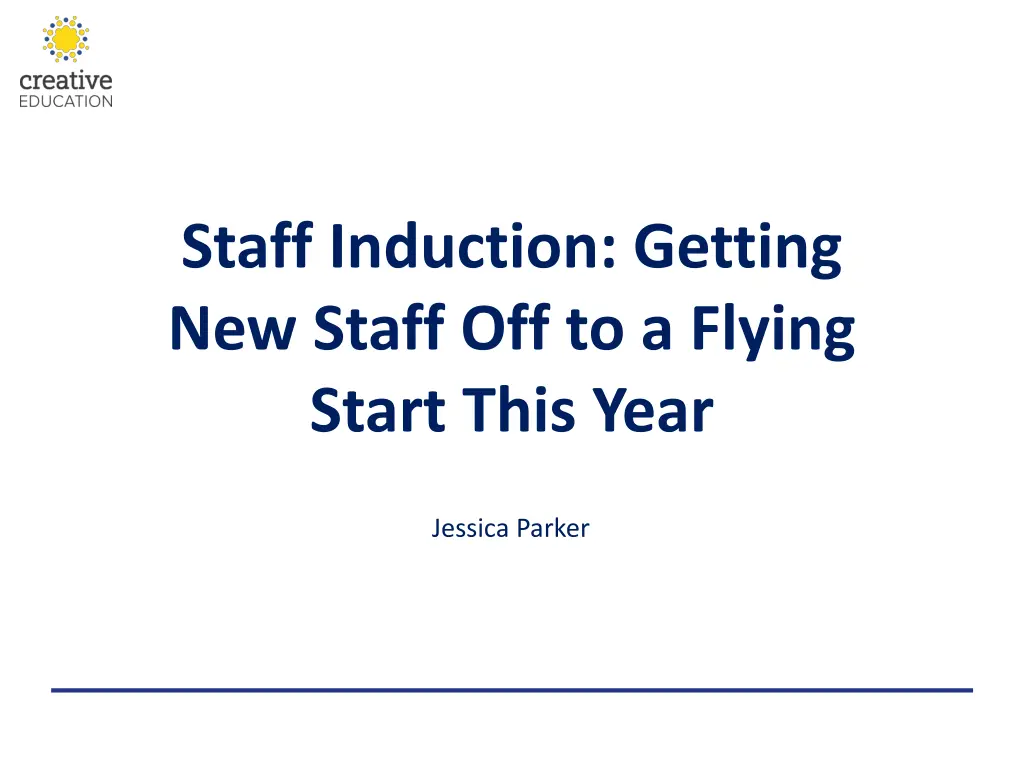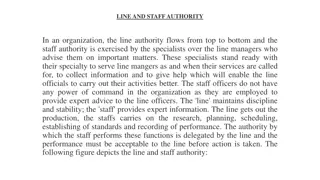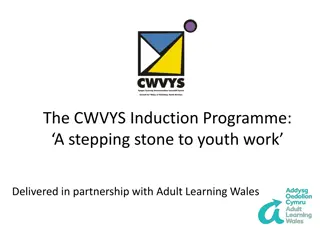
Effective Staff Induction Strategies for School Success
Explore practical tips and strategies to support new staff settling into your school, fostering a sense of belonging, understanding the importance of staff induction, what a good induction entails, and essential elements to include in the induction process for a successful start.
Download Presentation

Please find below an Image/Link to download the presentation.
The content on the website is provided AS IS for your information and personal use only. It may not be sold, licensed, or shared on other websites without obtaining consent from the author. If you encounter any issues during the download, it is possible that the publisher has removed the file from their server.
You are allowed to download the files provided on this website for personal or commercial use, subject to the condition that they are used lawfully. All files are the property of their respective owners.
The content on the website is provided AS IS for your information and personal use only. It may not be sold, licensed, or shared on other websites without obtaining consent from the author.
E N D
Presentation Transcript
Staff Induction: Getting New Staff Off to a Flying Start This Year Jessica Parker
Aims of the Webinar To explore practical strategies to support staff to settle into your school To explore practical strategies to enable staff to rapidly feel part of the team
Why is staff induction important? Evidence shows consistently that organisations that have thorough and welcoming induction processes retain their staff. Performance issues can be linked back to poor induction e.g. lack of clarity around roles, remits, responsibilities. It is a statutory requirement that your new starter understands the contractual aspects.
What does a good staff induction look like? Lay the foundations first - relationships before knowledge Include all new staff irrespective of their role Be tailored towards their specific needs Cover their responsibilities e.g. safeguarding, the role more generally and the standards expected of the organisation. Meet and get to know their colleagues
What to include... 1. A tour of the buildings they will be in - demonstratehow to use key features, where to find things, who to ask for support during the day. 2. Introduction to colleagues - this often works well in more informal settings such as the staff room/coffee shop on site. Place emphasis on getting to know the person and not just the job itself. 3. Health and safety protocols and requirements - this works well as a short recorded video and quiz as pre-learning which can be done at their leisure prior to starting.
What to include... 4. Access to all policies electronically - staff should be able to access copies of safeguarding, mental health, PREVENT, medical policies etc. They will need to have signed a copy of these which should be kept on file. 5. Buddy system - many education settings that do inductions well assign the new staff members with a buddy who can take them through policies and procedures in more of an interaction way, as well as showing them how to use key equipment such as self-service machines, employee self-service or other pay information. 6. Terms and conditions of employment - this should be preferably done on a 1:1 basis with plenty of time built in for questions. Provide the documents before the meeting so that they can read through and make a list of any questions they may have.
What to include... 7. Identify training needs - the earlier on we identify training the needs, the more staff will feel invested in and supported. This can help to tailor make training which meets their specific needs. 8. Don t forget training on working with specific groups - don t assume that all staff have received specific training or have experiencing working with SEND, EHCP, EAL students. Some schools have now taken to providing training memberships for staff to subscribe to online courses with a commitment to completing identified units of learning by a certain date.
Three key words Belonging Connection Foundations
It should go beyond understanding their role... Of course, the practical things are fundamental but so are these two commonly overlooked areas. 1. Social and emotional aspects of starting the new job - we can t do our best if we don t feel guided and that we belong. Consider how you can help the new staff members to settle into school life generally. 2. Understanding the culture of the organisation - there are vast differences in the way that schools operate so care also needs to be taken to gradually help the new staff members to have learning opportunities around this.
Consider their specific needs... The needs of an experienced teaching assistant with many years under their belt as compared to a teacher who took a career break for 10 years are going to be very different. Think about the mix of people that they will be working with e.g. age, gender balance, experience etc. Particularly for those new to the role, new to the area or returning to work after taking career breaks, they will require more practical support. This might include: 1. 2. 3. Recommendations for childcare arrangements Where to go for lunch Are there social activities outside of work they can attend? Such as a staff gym club or social nights? This can help them to integrate better into the team.
Plan a timetable of induction activities... One mistake many organisations make is trying to cover everything there is to know about the job into half a day. Sometimes new members of staff may feel overwhelmed or confused... Instead: 1. Collaborate with the new starter to create an induction timetable which may can be spread out as much as is practical to do so. Assign a different member of the new person s team to each of the activities so that they can get to know their colleagues quicker. Arrange check in meetings regularly to reflect on their learning and provide a space for questions/reflections. This often works better with their mentor rather than HR or senior management but use your judgement. 2. 3.
Short of time? Prioritise what needs to be done first such as health and safety, signing of contracts, how to login and use ICT equipment and a tour of the school. Make decisions about what can be self-taught, what could be pre-recorded to play in their own time... Some of the tasks on your induction list can be done self-sufficiently, giving you more time to invest in the things that really matter with the new starter.
Catering for Specific Needs Organisations that take the time to explain what they do to be an equal opportunities employer are more likely to have staff that feel safe and want to come to work each day. Do you have equality and diversity working groups which meet to reflect on what the organisation can do to support disabled teachers, those with mental health concerns, LGBTIQ+ etc? Do you new staff know the policies around what adjustments they can ask for, what the policies and procedures are for reporting discrimination and harassment? Are they part of a union and do they have the contact information for the representatives within your organisation?
The first few weeks It is important that we keep intensive support for new staff members in place throughout the first few weeks. There should be regular meetings to discuss their needs as questions may not always emerge straight away. Some staff may take time to establish their trust in you and share specific needs or requirements they may have-allow time and plan for this. Staff should be added to lesson observation list once the induction has been fully completed and the staff member is integrated into the team.
Further learning opportunities You may like to consider offering further learning opportunities for new staff members. This might include attending meetings that they would not usually be part of so that they can learn more about the way that organisation works. For example, shadowing staff in other departments, attending governor meetings or departmental planning meetings. They will learn more about the organisation but also meet a larger pool of colleagues, particularly helpful in larger schools.
Team Building This may sound like a clich but it is a very essential way of building bonds between staff. This should fun and ideally nothing to do with the job or education. The focus is about helping staff members to bond. Some of the popular activities at the moment are virtual escape rooms, building challenges and inter-departmental quizzes about trivia. All team building should involve new and existing staff members.
Socialisation goes beyond team building Some would argue that induction should never stop...there are always new things to learn, new people to meet. Could you consider: 1. 2. 3. 4. An optional staff wellbeing programme Social activities calendar Celebration events to demonstrate staff value Ongoing opportunities for 1:1 or small group support for those who need it
Three key words Belonging Connection Foundations These elements can work towards providing a safe and supportive work environment
Aims of the Webinar To explore practical strategies to support staff to settle into your school To explore practical strategies to enable staff to rapidly feel part of the team






















